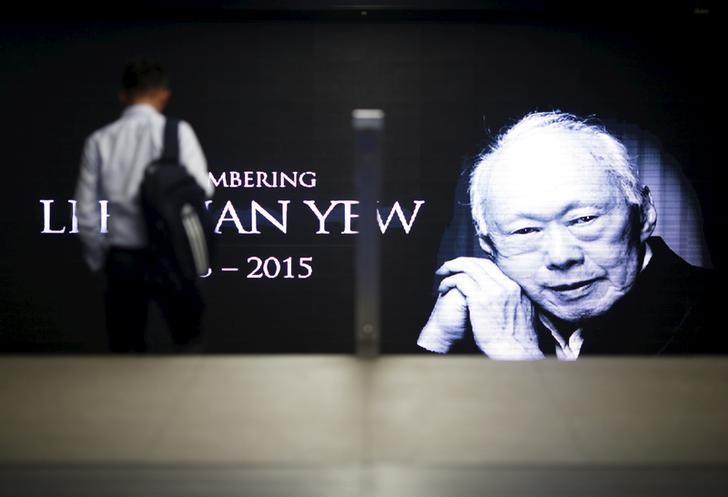By Rujun Shen and Saeed Azhar
SINGAPORE (Reuters) - Some dissidents and opponents of Lee Kuan Yew believe that, with the death of modern Singapore's iron-handed founding father this week, the political restrictions he imposed in the name of security will begin to ease.
There is little sign of immediate change, however, as Lee's son, who is prime minister, has given no indication he will allow those in self-imposed exile an easy return home.
Tang Fong Har, now living in Hong Kong, who was among 22 people detained in 1987 for allegedly being part of a Marxist plot against the government, said the "litmus test" would be whether Singapore abolished the Internal Security Act, a legacy of British colonial rule.
That allows authorities to detain anyone seen as a threat to security for up to two years.
Teo Soh Lung, a retired lawyer who was among activists arrested in 1987 and 1988 but who remained in Singapore and resumed her legal practise, was not optimistic of rapid change.
"All these people want to return, but I don't think they will be allowed back," she said, citing the legacy of Lee and his longstanding fight against communism.
Lee, credited with propelling tiny Singapore from an economic backwater to a country with one of the world's highest per-capita gross domestic product (GDP), was unapologetic to the end for crushing opponents, saying it was essential for Singapore's security.
Like his father, Prime Minister Lee Hsien Loong has kept a lid on free speech and has used the defamation laws to sue critics. Lee and other leaders have said that lawsuits are necessary to safeguard their reputations.
The current government also banned a 2013 documentary "To Singapore, with Love", based on dissidents abroad.
NO ONE "ABOVE LAW"
The government was challenged this month by an opposition party to review the criteria for allowing political dissidents living in self-imposed exile to return.
Grace Fu, minister in Prime Minister Lee's office, told parliament that some had outstanding offences to answer for and "cannot be expected to be placed above the law".
Those who had been associated with the now-disbanded Communist Party of Malaya would have to renounce violence and be interviewed by the security agencies, she said, adding: "These conditions are not new or unreasonably onerous."
The government did not comment for this article, and referred Reuters to the comments Minister Fu made in parliament.
Despite previous run-ins with the authorities, Tan Wah Piow, an exiled lawyer living in London whose citizenship was revoked in 1987, says he would like to return to Singapore after 40 years.
"The death of Lee Kuan Yew will certainly unlock the political inhibitions and liberate the people from fear," he told Reuters.
Tan, a former student activist, fled Singapore in 1975 after serving a prison term for rioting, and eventually made his way to Britain in 1976, on what the government said was a forged passport. He is now a British citizen.
Asked whether he expected to return to Singapore, he said: "I think so. I'm just past 60. I hope there will be at least a couple of decades and I hope some changes will come."
SUBJECT TO SCRUTINY
At least for now, self-exiled political dissidents would be subject to scrutiny from the government if they returned; should they be deemed a threat to security, they could be detained under Singapore's Internal Security Act.
They would also run the risk of falling foul of a lawsuit from Lee's family were they to make comments about him that were judged defamatory - under the city-state's penal code, it is possible to defame someone who is dead.
Critics can still be pursued through the courts, leading to possible bankruptcy and banishment.
Phil Robertson, deputy director of Human Rights Watch's Asia section, said many exiles have remained abroad while the government was dominated by the People's Action Party (PAP), which has ruled Singapore with little opposition since the island state won independence half a century ago.
"I think it's too early to say whether there will be any moderating of the PAP ... but I think that they would be smart to do so, and show that many of those historical divisions are in the past," he said.
Tang, the Hong Kong lawyer, held out little hope of being able to return herself, saying that if she did she would not agree to be interrogated.
However, she voiced cautious optimism for Singapore's future.

"What is done is done and we cannot undo the past, but we can move forward to create a modern democratic Singapore."
(additional reporting by Rachel Armstrong; Editing by John Chalmers and Mike Collett-White)